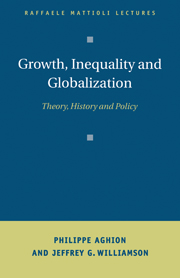Book contents
- Frontmatter
- Contents
- Preface
- Introduction
- Part I Inequality and economic growth
- Part II Globalization and the labor market: using history to inform policy
- 1 Globalization, labor markets and convergence in the past
- 2 Globalization and the causes of workers' living standard convergence in the past
- 3 Policy backlash: can the past inform the present?
- Author index
- Subject index
1 - Globalization, labor markets and convergence in the past
Published online by Cambridge University Press: 04 November 2009
- Frontmatter
- Contents
- Preface
- Introduction
- Part I Inequality and economic growth
- Part II Globalization and the labor market: using history to inform policy
- 1 Globalization, labor markets and convergence in the past
- 2 Globalization and the causes of workers' living standard convergence in the past
- 3 Policy backlash: can the past inform the present?
- Author index
- Subject index
Summary
Globalization, convergence, and history
Two important features of the world economy since 1970 also characterized the world economy a century ago. First, the earlier period was one of rapid globalization: capital and labor flowed across national frontiers in unprecedented quantities, and commodity trade boomed in response to sharply declining transport costs. Second, the late nineteenth century underwent an impressive convergence in living standards, at least within most of what we would now call the OECD, but what historians call the Atlantic economy. Poor countries around the European periphery tended to grow faster than the rich industrial leaders at the European center, and often even faster than the labor-scarce countries overseas in the New World. This Atlantic economy excluded, of course, Asia, Africa, the Middle East, and Eastern Europe. There were also some who failed to catch up even around the exclusive Atlantic economy periphery, but they were few.
A recent literature has developed which argues that most of the convergence between 1850 and 1914 was due to the open economy forces of trade and mass migration. By inference, it also suggests that convergence stopped between 1914 and 1950 because of de-globalization and implosion into autarchy. These facts are directly relevant to debates over globalization today. This revisionist historical research also shows that these globalization forces had an important distributional impact within participating countries. Perhaps most importantly, it suggests that these distributional events helped create a globalization backlash which caused a drift toward more restrictive immigration and tariff policy prior to World War I. These chapters will visit all of these issues.
- Type
- Chapter
- Information
- Growth, Inequality, and GlobalizationTheory, History, and Policy, pp. 105 - 131Publisher: Cambridge University PressPrint publication year: 1999

